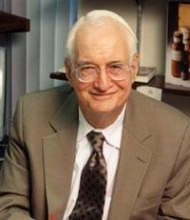Death of Renowned Penn Chemist Ralph F. Hirschmann, 1922-2009

Ralph F. Hirschmann, the Rao Makineni Professor of Bioorganic Chemistry at Penn and former head of research at Merck, passed away peacefully on June 20. A 2002 winner of the National Medal of Science, he made seminal contributions to organic, medicinal and bioorganic chemistry for more than 50 years.
Dr. Hirschmann's contributions include the first chemical synthesis in solution of an enzyme, ribonuclease, in 1969, regarded as one of synthetic organic chemistry's noteworthy achievements of the 20th century. Early in his career he discovered that chemical transformations can be controlled at the same time by both the disposition of electrons and the geometric arrangement of atoms. This concept, which Hirschmann termed stereoelectronic control, has gained great importance in chemistry.
A half-dozen widely used medications stem from Dr. Hirschmann's 37-year tenure as Merck's head of basic research, including the parasite-fighting Ivomec, now used to combat river blindness in developing nations. While with Merck, his research team discovered or developed several major drugs, including Vasotec, Lisinopril, Primaxin, Ivomec, Mevacor and Proscar.
A naturalized American citizen born in Bavaria, Hirschmann came to the United States in his teens and earned a bachelor’s degree from Oberlin College in 1943. Following three years of military service in the Pacific during World War II, he entered graduate school at the University of Wisconsin (Madison) where he received a Ph.D. That year he joined the Merck Research Laboratories as a process research chemist. He retired from Merck in 1987, having served as Senior Vice President of Chemistry and of Basic Research.
Considered by some to be his second career, Hirschmann’s tenure at Penn began in 1987. Here, he initiated collaborative research in the field of peptidomimetics. His team published 56 papers, mostly describing new approaches to the design of peptidomimetics and of haptens for the generation of catalytic antibodies. Taken together, the peptidomimetic research at Penn proved to be seminal.
In addition to his Penn post, Hirschmann served from 1987 to 1999 as University Professor of Biomedical Research at the Medical University of South Carolina. That university and Wisconsin have both established Ralph F. Hirschmann professorships in his honor. He holds honorary doctorates from these two institutions as well as Oberlin, where he also served on the Board of Trustees.
Hirschmann has authored some 150 scientific papers, primarily on steroid and peptide/protein research, and is named inventor or co-inventor on nearly 100 patents. He was chairman of the Board of Trustees of the Gordon Research Conference in 1984/85, and he served on the editorial or advisory boards of numerous international journals. He served also on a study section of the National Institutes of Health and on committees of the National Research Council and the National Science Foundation.
Hirschmann has been recognized with three endowed lectureships, and three chairs are linked to his name. He has been honored through many awards including the Merck & Co. Inc. Board of Directors Scientific Award and the National Academy of Sciences Award for the Industrial Application of Science. He also received the Romanes Lectureship Award in Pharmacy (Edinburgh), the Agnes Borrowman Special Lectureship in Pharmacy (London University), the Nichols Medal (New York section, ACS), Chemical Pioneer Award (American Institute of Chemists), the Microbial Chemistry Medal (Kitasato University, Tokyo), the Gold Medal of the Max Bergmann Kreis (Munich), the first Gensia Lecturer, Frontiers in Chemistry Lecture Series [Scripps Clinic and Research Foundation (now The Scripps Research Institute)], the Alfred Burger Award (ACS), the Dr. Josef Rudinger Award of The European Peptide Society, the Edward E. Smissman Bristol Myers Squibb Award (ACS), the Arthur C. Cope Medal, the presidential National Medal of Science awarded by President Clinton in 2000, and the Willard Gibbs Medal (Chicago Section, ACS) in 2002. He is a member of the National Academy of Sciences, a Senior Fellow of the Institutes of Medicine of the National Academies, and a Fellow of the American Academy of Arts and Sciences.





